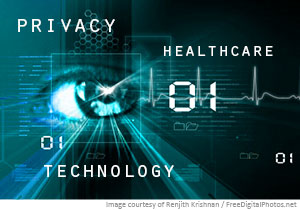
A commercial ran recently where a man getting in his car sees a sticky note on his window. When he reads the note it says, "you are going to have a heart attack today." The voiceover states, "It's too bad we aren't notified when we are going to have a heart attack."
I look at the amazing world of healthcare and the changes taking place to help us and our physicians monitor and manage our health. Is the scenario played out above going to become reality? I don't know the answer, but I wouldn't want to discount it. So what does this all mean when it comes to the coexistence of medical technology and privacy?
Technology advancements in medicine and electronic records bring greater awareness and enhanced abilities for healthcare providers and patients to monitor and improve health. The discussion around radio-frequency identification technology and implantable radio frequency transponder systems for individual safety, cost, privacy, security and regulatory controls has been evolving over the last decade and more. The Food and Drug Administration began working with U.S. companies at least as early as 2002 to monitor marketing and approval of micro- miniature transponders to be encapsulated in medical grade glass that could be inserted by hypodermic needles under the skin of the upper arm in humans. Anticipating possible misuse of technology, Missouri enacted state labor law V.A.M.S 285.035 in 2008, prohibiting employers from requiring employees to be implanted with microchip technology.
In the increasingly technology-connected world, privacy by design – including notice and consent – must be incorporated at all levels of development and use in order to protect individuals from theft of medical information for possible wrongful use or malicious control of medical devices. I recently attended this year's International Association of Privacy Professionals conference and heard George Savage, Chief Medical Officer at Proteus, present about his company's fascinating new medical technology. Mr. Savage highlighted digital medicine and healthcare innovation with the demonstration of ingestible micro-sensors the size of a grain of sand that, when swallowed, emit a signal to be detected by a patch monitor worn by the patient. The micro-sensor can track heart rate, sleep pattern, activity levels and other physiological parameters. Many new, groundbreaking medical technology monitoring devices like this are being introduced to the marketplace. The excitement new technology brings to healthcare will also create healthy discussions on its future impact on privacy and security. Given the current legislative and case law discussions on how to harmonize the 46+ state laws on security breach notification, cyber security, FTC oversight and more…it is expected that much future discussion will center on applications of use for the data gathered from this modern technology.
Jarrod Magan, VP of Client Technology Services for Sedgwick, wrote a blog titled "Staying ahead of the risk management technology curve," where he talked to other technology leaders in the risk insurance field about this topic. Jarrod addressed the issue very well when he said, "Companies should develop solutions with a 'privacy by design' approach and not wait to address issues once a product has been deployed." Sedgwick will continue to monitor the landscape and how decisions and developments may affect insurance programs, state workers' compensation and healthcare in general.
What medical technologies are you already using in your daily life? How is medical technology changing the way you manage your healthcare? Please tell us as we continue to look at the evolution of technology, healthcare and privacy.
Brenda Corey, SVP, Compliance, Government Relations & Regulatory